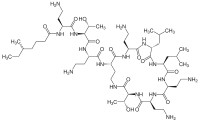
Photo from wikipedia
Background and objectives: Colistin is used for the treatment of multidrug-resistant (MDR) Gram-negative bacteria infection in critically ill patients. It is recommended to adjust the dose in cases of renal… Click to show full abstract
Background and objectives: Colistin is used for the treatment of multidrug-resistant (MDR) Gram-negative bacteria infection in critically ill patients. It is recommended to adjust the dose in cases of renal impairment but not in cases of augmented renal clearance (ARC). The aim of this study was to determine colistin use pattern in patients with different renal functional states. Materials and Methods: Adult patients admitted to intensive care units of single Latvian hospitals in the years 2015–2017 with an MDR Gram-negative bacterial infection and at least 72 h colistin therapy were included in this study. Data were collected retrospectively from medical notes. Colistin use pattern and outcomes were analyzed in patients with different renal function prior to colistin therapy: normal, ARC, impaired, and on renal replacement therapy (RRT). Results: 100 cases of colistin use met the inclusion criteria. The study group was heterogeneous, and patients had different renal function states prior to colistin therapy-from continuous RRT (18 cases) to ARC (16 cases). The standard colistin dose of 9 million units (MU) daily was the most common dose among the patients. In many cases (43%), colistin dose adjustment did not follow the recent recommendations of drug manufacturers-this was mainly in patients with renal impairment prior to colistin therapy. Eighteen cases of colistin acute kidney injury (AKI) were detected, mostly (10 cases) in patients with normal renal function and without ARC prior to colistin therapy. No patients with colistin AKI needed RRT. Conclusions: Colistin doses varied greatly among patients, and in patients with renal function impairment it was commonly not in accordance with the summary of product characteristics (SPC). Patients with ARC mostly received a standard colistin daily dose of 9 MU daily, but the cumulative dose had a tendency to be higher and duration of colistin therapy was longer in comparison with other patient groups. ARC’s role in the development of colistin nephrotoxicity is still unclear.
Journal Title: Medicina
Year Published: 2019
Link to full text (if available)
Share on Social Media: Sign Up to like & get
recommendations!